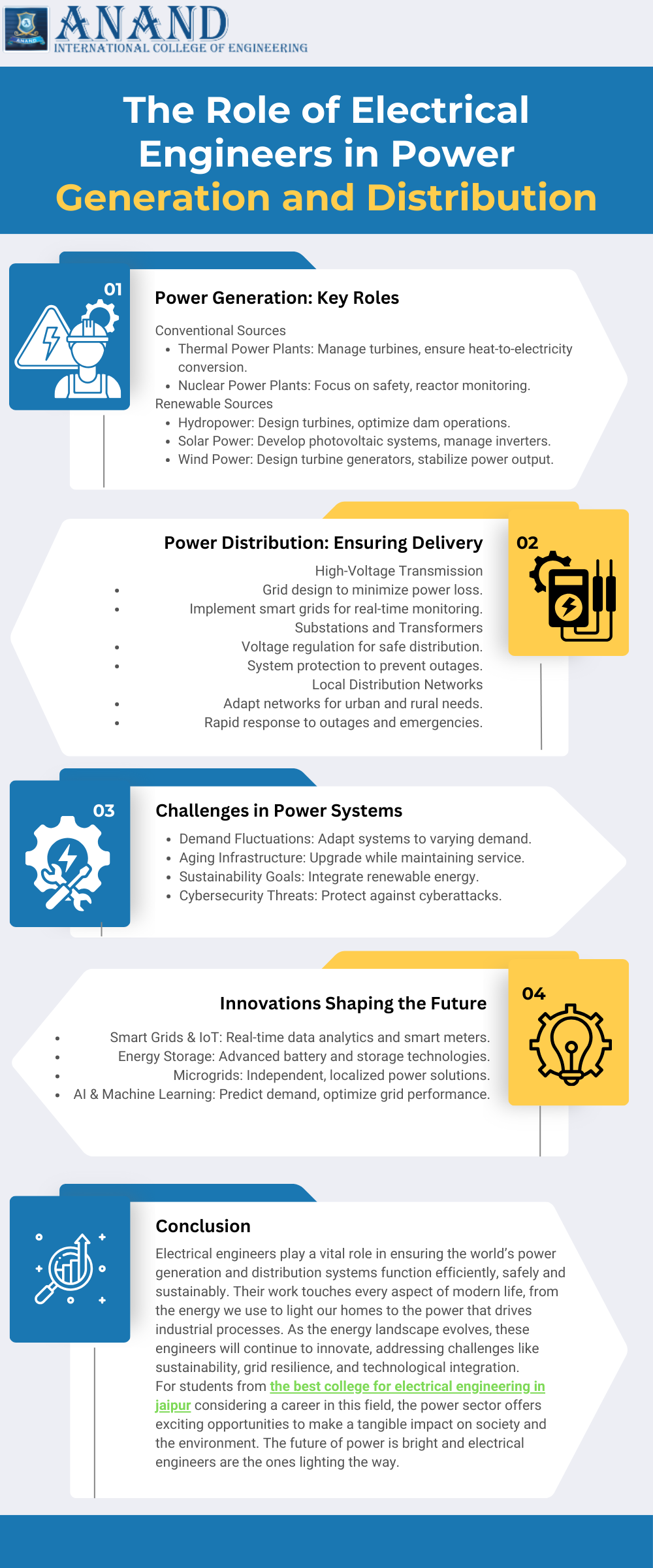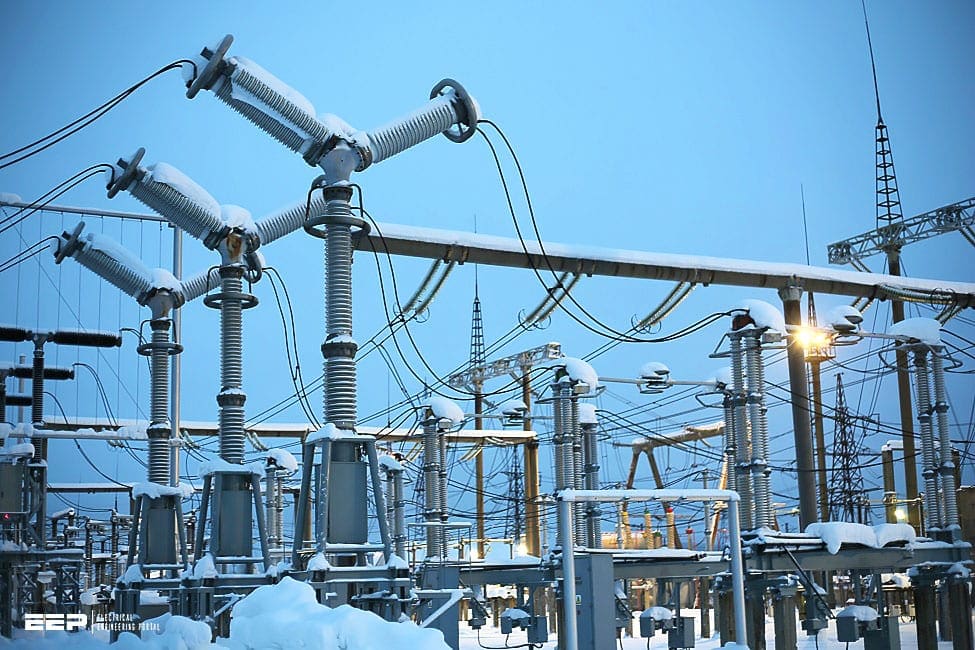Today, a reliable power supply is the backbone of modern life. From the moment we switch on a light to charging our smartphones or running heavy machinery, electrical energy powers nearly everything. At the heart of this essential service are electrical engineers from the top private college for electrical engineering in Jaipur who design, operate and innovate within power generation and distribution systems. Their role goes far beyond ensuring electricity reaches our homes and industries. It involves balancing efficiency, sustainability and technological advancement.
This article explores the critical role electrical engineers play in power generation and distribution, the challenges they face and the innovations they drive.
Power Generation: Where It All Begins
Power generation is the process of converting various energy sources into electrical energy. Electrical engineers are instrumental in every phase of this transformation whether it involves harnessing traditional or renewable sources. Here’s a closer look at the major generation methods and the engineer’s role in each:
1. Conventional Power Plants (Fossil Fuels and Nuclear)
- Thermal Power Plants: Electrical engineers design systems to efficiently convert heat energy (from coal, natural gas or oil) into electrical energy. They ensure turbines and generators work optimally and manage complex control systems to regulate power output.
- Nuclear Power Plants: Engineers here focus on maintaining safety and efficiency. They monitor reactors and ensure that the generated heat is safely converted into electricity while adhering to stringent safety standards.
2. Renewable Energy Sources
- Hydropower: Electrical engineers oversee the design of turbines and generators that convert the mechanical energy of water into electricity. They also work on optimizing dam operations and integrating hydropower with larger grids.
- Solar Power: Engineers develop and maintain photovoltaic systems that capture sunlight and convert it into electrical energy. They also manage inverters that convert direct current (DC) into alternating current (AC) for grid compatibility.
- Wind Power: Electrical engineers play a critical role in designing wind turbine generators and managing the power electronics that stabilize and distribute the generated energy.
In all these power generation systems, electrical engineers ensure the balance between energy production, cost-efficiency and environmental sustainability.
Power Distribution: Delivering Energy to the End User
Once electricity is generated it must be transmitted and distributed to consumers which is a complex process involving transmission lines, substations and transformers. Electrical engineers are responsible for designing, maintaining and upgrading these networks to ensure reliable and safe delivery.
1. High-Voltage Transmission
- Grid Design and Maintenance: Engineers design transmission lines that transport electricity over long distances. They work on minimizing power loss through innovative conductor materials and ensuring the structural integrity of the lines.
- Smart Grid Integration: Modern electrical engineers are at the forefront of implementing smart grids which use digital technology to monitor and manage electricity flow more efficiently.
2. Substations and Transformers
- Voltage Regulation: Electrical engineers design and manage substations where high-voltage electricity is stepped down to lower voltages suitable for local distribution. They ensure that transformers operate efficiently without overheating or losing energy.
- System Protection: They develop protection systems to guard against short circuits, overloads, and other faults that could disrupt the power supply.
3. Local Distribution Networks
- Urban and Rural Networks: Engineers design distribution systems tailored to the needs of cities where demand is high and concentrated, and rural areas where reaching remote locations is a challenge.
- Emergency Response: In the event of outages or natural disasters, electrical engineers quickly assess damage and restore power ensuring minimal disruption.
Challenges Facing Electrical Engineers in Power Generation and Distribution
Electrical engineers encounter a range of challenges in ensuring a stable and efficient power supply:
1. Demand Fluctuations
The rise of electric vehicles, data center, and high-tech industries creates fluctuating demand patterns. Engineers must forecast demand accurately and design systems that can adapt to peaks and troughs without compromising service.
2. Aging Infrastructure
Many power grids around the world are decades old. Electrical engineers are tasked with upgrading or replacing outdated equipment while ensuring continuous service.
3. Sustainability and Carbon Reduction
Electrical engineers are key players in integrating renewable energy sources into the grid as the world is moving towards cleaner energy. This transition presents challenges in maintaining grid stability since renewable sources like wind and solar are intermittent.
4. Cybersecurity Threats
With the increasing digitalization of power grids, cybersecurity has become a critical concern. Engineers must design secure systems that protect critical infrastructure from cyberattacks.
Innovations and Future Trends
The role of electrical engineers in power generation and distribution is evolving rapidly with new technologies:
1. Energy Storage Solutions
Energy storage systems like batteries and supercapacitors are crucial. Engineers are innovating in battery technology and grid-scale storage to ensure a steady supply of power even when renewable sources are unavailable.
2. Microgrids and Decentralized Power
Microgrids which can operate independently from the main grid, offer localized power solutions. Electrical engineers are developing resilient microgrid systems for remote areas and critical infrastructure.
Conclusion
Electrical engineers play a vital role in ensuring the world’s power generation and distribution systems function efficiently, safely and sustainably. Their work touches every aspect of modern life, from the energy we use to light our homes to the power that drives industrial processes. As the energy landscape evolves, these engineers will continue to innovate, addressing challenges like sustainability, grid resilience, and technological integration.
For students from the best college for electrical engineering in jaipur considering a career in this field, the power sector offers exciting opportunities to make a tangible impact on society and the environment. The future of power is bright and electrical engineers are the ones lighting the way.


